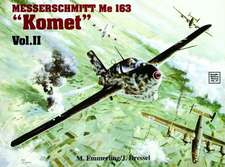The Evolution of Strategy: Thinking War from Antiquity to the Present
Autor Beatrice Heuseren Limba Engleză Paperback – 13 oct 2010
| Toate formatele și edițiile | Preț | Express |
|---|---|---|
| Paperback (1) | 241.90 lei 3-5 săpt. | |
| Cambridge University Press – 13 oct 2010 | 241.90 lei 3-5 săpt. | |
| Hardback (1) | 910.99 lei 6-8 săpt. | |
| Cambridge University Press – 13 oct 2010 | 910.99 lei 6-8 săpt. |
Preț: 241.90 lei
Nou
46.29€ • 48.33$ • 38.31£
Carte disponibilă
Livrare economică 14-28 martie
Specificații
ISBN-10: 052115524X
Pagini: 594
Ilustrații: black & white tables
Dimensiuni: 152 x 226 x 30 mm
Greutate: 0.82 kg
Editura: Cambridge University Press
Colecția Cambridge University Press
Locul publicării:Cambridge, United Kingdom
Cuprins
Part I. Introduction: 1. What is strategy?; Part II. Long-Term Constants: 2. Warfare and mindsets from antiquity to the middle ages; 3. Warfare and mindsets in early modern Europe; 4. Themes in early thinking about strategy; Part III. The Napoleonic Paradigm and Total War: 5. The age and mindset of the Napoleonic paradigm; 6. The Napoleonic paradigm transformed: from total mobilisation to total war; 7. Challenges to the Napoleonic paradigm vs. the culmination of total war; Part IV. Naval and Maritime Strategy: 8. Long-term trends and early maritime strategy; 9. The age of steam to the First World War; 10. The World Wars and their lessons for maritime strategists; 11. Maritime strategy in the nuclear age; Part V. Air Power and Nuclear Strategy: 12. War in the third dimension; 13. Four schools of air power; 14. Nuclear strategy; Part VI. Asymmetric or 'Small' Wars: 15. From partisan war to people's war; 16. Counterinsurgency; Part VII. The Quest for New Paradigms after the World Wars: 17. Wars without victories, victories without peace; 18. No end of history: the dialectic continues; 19. Epilogue: strategy making vs. bureaucratic politics; 20. Summaries and conclusions.
Recenzii
'Beatrice Heuser has produced a book of immense and unique scholarship. The study provides the most detailed and comprehensive survey yet written on strategic thinking across the ages from Roman times to the contemporary debates about the future of warfare in the twenty-first century. It is essential reading for any serious university or military student of strategic studies or international security.' John Baylis, Emeritus Professor and formerly Pro Vice Chancellor, Swansea University
'With this work Beatrice Heuser has made a major contribution. This is much more than just a survey of strategy through the ages, but a deep, intellectual examination of the complex relationships between strategy and war through the course of history.' Williamson Murray, Professor Emeritus of History, Ohio State University
'Heuser's history of strategic theory and practice demonstrates extraordinary range, erudition, intelligence, and insight. She appears to have read everything, in many languages, about attempts to apply armed force effectively. The Evolution of Strategy will be the first port of call for those wanting to check up on the development of land strategy in the eighteenth century, maritime strategy in the nineteenth century, nuclear strategy in the twentieth century, or counterinsurgency strategy in the twenty-first century.' Lawrence D. Freedman, Foreign Affairs
'Beatrice Heuser … has written one of the most important books on strategy and war to appear in recent years.' H. R. MacMaster, Survival
'… Hauser's deeply intellectual analysis of the history of military strategy achieves its aim and achieves it with style. It is comprehensive without being dry, it is intellectual without being geekish and it is authoritative without being academically arrogant … It should be read, digested, considered and appreciated like one would approach a Cuban cigar and cognac in the study or ante-room. The author is to be congratulated for a fine piece of work and a major contribution to the study of strategy.' Dave Mugridge, The Naval Review
Descriere
Is there a 'Western way of war' which pursues battles of annihilation and single-minded military victory? Is warfare on a path to ever greater destructive force? This magisterial account answers these questions by tracing the history of Western thinking about strategy - the employment of military force as a political instrument - from antiquity to the present day. Assessing sources from Vegetius to contemporary America, and with a particular focus on strategy since the Napoleonic Wars, Beatrice Heuser explores the evolution of strategic thought, the social institutions, norms and patterns of behaviour within which it operates, the policies that guide it and the cultures that influence it. Ranging across technology and warfare, total warfare and small wars as well as land, sea, air and nuclear warfare, she demonstrates that warfare and strategic thinking have fluctuated wildly in their aims, intensity, limitations and excesses over the past two millennia.













